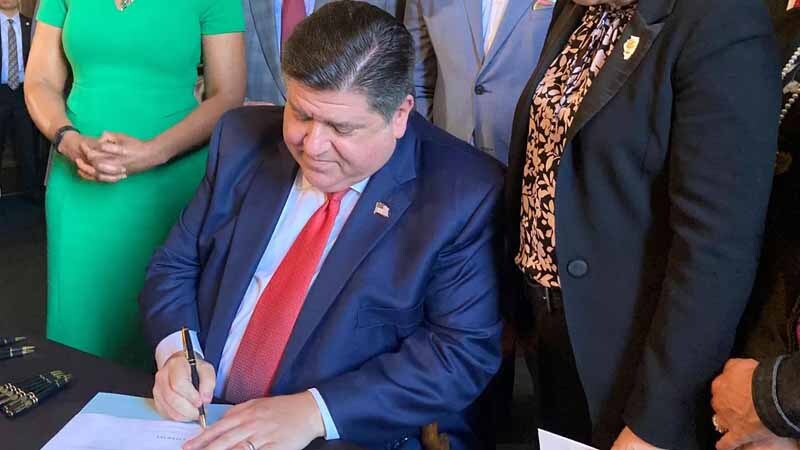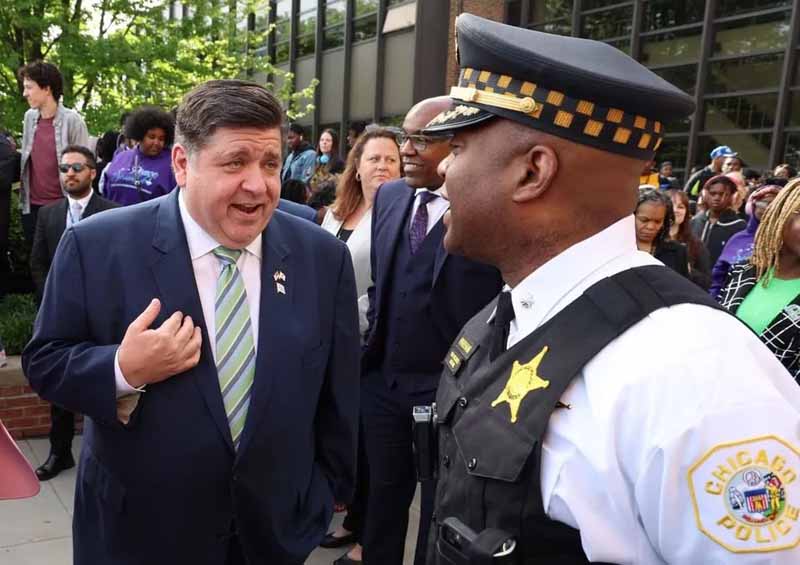 News Staff
News Staff![]() -
July 31, 2023 -
Society -
Non-Us Citizen polic
Gov Pritzker
-
3.8K views -
0 Comments -
0 Likes -
0 Reviews
-
July 31, 2023 -
Society -
Non-Us Citizen polic
Gov Pritzker
-
3.8K views -
0 Comments -
0 Likes -
0 Reviews

DLNews Politics:
Until now, all police officers in Chicago and the state of Illinois were required to be citizens. But with a sweep of his pen, Gov Pritzker has changed that.
The new law allows those legally authorized to work in the US and possess firearms to become police officers or deputy sheriffs. It will take effect on January 1st.
Critics Say It’s “Madness”
In a move that has drawn criticism from police organizations, Illinois Gov. J.B. Pritzker, D. they have signed a law bill allowing non-U.S. citizens to become police officers in the state. The legislation, House Bill 3751, goes into effect Jan. 1.
The measure, which bypasses federal law and allows legally authorized individuals to work in the United States and those who remain in the country under the Deferred Action for Childhood Arrivals process to apply, alleviates a shortage of officers across the state.
However, the move is controversial and slammed by critics, including Republican Colorado Rep. Lauren Boebert. In a tweet on Sunday, she said: “In our state, illegals can now become police officers and arrest our citizens. This is madness!”

The Fraternal Order of Police Says It’s “Nothing New”
The FOP has condemned the bill, saying it would send a “terrible message” to the public. They say it could create “chaos” at police departments and allow non-citizens to arrest American citizens.
The bill, House Bill 3751, goes into effect Jan 1. It allows people legally permitted to work in the United States and those deferred from deportation under the Deferred Action for Childhood Arrivals (DACA) process to apply to become police officers.
The chiefs of the Beardstown and Jacksonville police departments said that they’re already struggling with officer shortages. They said that having a recruit undergo training takes up a lot of time and resources. And they already have to wait on applicants to go through interviews, background checks, and psychological evaluations. They don’t want to add another step in that process. The chiefs also said that if an officer is disciplined, it’s up to their superior to investigate the incident and decide on punishment.
Pritzker Says He’s “Proud” to Sign the Bill
Pritzker said he was “proud” to sign House Bill 3751. He noted that “we have people from all walks of life in Illinois.” He pointed to legislation passed in his first year requiring more transparency from lobbyists and that an energy bill still being negotiated contains new ethics rules regarding utilities.
He also praised House Speaker Emanuel Welch as a “breath of fresh air” replacing scandal-tarred predecessor Michael Madigan and promised to fund Democratic candidates for state office. He said that restoring voter trust in government is a priority for him.
But it’s a challenging task, he admitted. “The public is very suspicious of their government.” He said the best way to rebuild trust is to restore transparency and accountability. He cited the Rebuild Illinois plan as a model. It involves closing corporate loopholes to boost state spending. He also touted his proposal to replace a flat income tax with a progressive one and the state’s plan to invest in schools and infrastructure.
The Bill’s Language
A bill making it easier for non-citizens to become police officers in Illinois has angered critics who slammed the idea of foreigners arresting American citizens. The measure, HB 3751, passed with bipartisan support in the state House and Senate this spring. It goes into effect on Jan. 1, 2024, and it would allow residents who aren’t citizens to work as police and sheriff’s deputies. Those who are permanent residents working towards citizenship or recipients of the Deferred Action for Childhood Arrivals program, commonly known as DACA, can apply.
The state’s Democratic governor defended the measure Monday, saying those who believe the bill will let immigrants who entered the country illegally become police officers are misinterpreting its language. He compared it to the governor's cuts to a state Medicaid-like program for low-income people without permanent legal status, saying those already enrolled now have to pay co-pays.
He cited research that shows nationwide law enforcement departments need help recruiting and retaining officers, contributing to staffing shortages. Center Square reports a recent rise in officer resignations and retirements exacerbates those shortages.

Desert Local News is an invitation-only, members-based publication built on fact-checked, non-biased journalism.
All articles are publicly visible and free to read, but participation is reserved for members—comments and discussion require an invitation to join.
We cover local, state, and world news with clarity and context, free from political agendas, outrage, or misinformation.